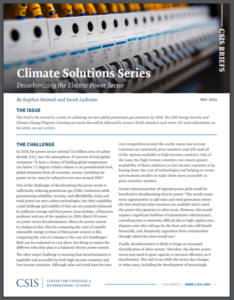Full Title: Climate Solutions Series: Decarbonizing the Electric Power Sector
Author(s): Stephen Naimoli and Sarah Ladislaw
Publisher(s): Center for Strategic and International Studies (CSIS)
Publication Date: May 12, 2020
Full Text: Download Resource
Description (excerpt):
In 2018, the power sector emitted 13.6 billion tons of carbon dioxide (CO2) into the atmosphere, 41 percent of total global emissions.1 To have a chance of holding global temperature rise below 1.5 degrees Celsius relative to its preindustrial level, global emissions from all economic sectors, including the power sector, must be reduced to net-zero around 2050.2
One of the challenges of decarbonizing the power sector is sufficiently reducing greenhouse gas (GHG) emissions while guaranteeing reliability, security, and affordability. Solar and wind power are zero-carbon technologies, but their variability could challenge grid stability if they are not properly balanced by sufficient storage and firm power. Jesse Jenkins, a Princeton professor and one of the speakers at CSIS’s March 30 event on power sector decarbonization, likens the power system to a balanced diet: directly comparing the costs of variable renewable energy to those of firm power sources is like comparing the cost of a banana to the cost of a hamburger.3 Both can be evaluated on cost alone, but doing so misses the different roles they play in a balanced electric power system.
The other major challenge is ensuring that decarbonization is equitable and accessible by both high-income countries and low-income countries. Although solar and wind have become cost competitive around the world, many low-income countries are extremely price-sensitive and will need all of the options available to high-income countries. One of the ways the high-income countries can ensure greater availability of these solutions in low-income countries is by buying down the cost of technologies and helping to create new business models to make them more accessible to price-sensitive markets.
